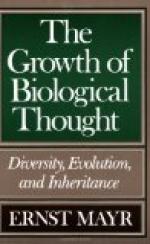As citizens of the republic, we have comparatively little cause to exult in the conceit of being freer or happier than other communities; much more in the chance, having broken the fetters of superstition and tyranny, next to rend those of false habit and fashion—to enthrone reason over the authority of one another’s eyes and prejudices: to say in truth,—
“Here the free spirit of
mankind at length
Throws its last fetters off; and who shall
place
A limit to the giant’s untamed strength,
Or curb his swiftness in the forward race?
Far, like the comet’s way through infinite
space,
Stretches the long untravelled path of
light
Into the depth of ages; we may trace,
Distant the brightening glory of his flight,
Till the receding beams are lost to human sight.”
Bryant.
Part IV.
Welfare as Dependent on Religion.
But in all our attempts to educate self-love into harmony with Universal benevolence, we contend with the enemy, somewhat as Hercules wrestled with Antaeus:—
Und erstickst du ihn nicht in den Luften frei, Stets wachst ihm die Kraft anf der Erde neu.* [If thou strangle him not high lifted in air, Fresh strength from the earth he continues to share.]
Thus we come to speak of present welfare, as dependent on the cultivation of the whole man—on a recognition of his immortality, his allegiance to his Maker, and his capacity for more disinterested sentiments, than self-love, however modified.
The influences thus accruing are a confirmation, from higher authority, of the conclusions approved by philosophy, ethics, the prudence which calculates how man should live with man, considered as but creatures of earth—a re-binding—a re-ligation to what was obligation before; and such precisely is the proper sense of the word religion.
That the promise of the life that now is attaches to godliness-the vivid recognition of a Father in heaven, with the union of reverence and love cherished by a dutiful child—and that naught else secures the possession, might be argued,—




